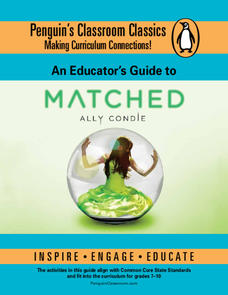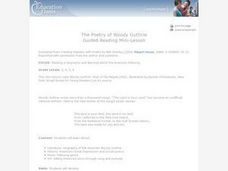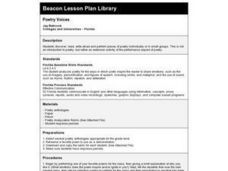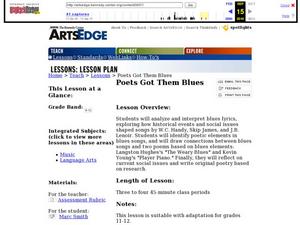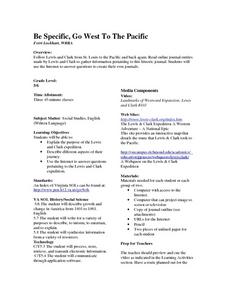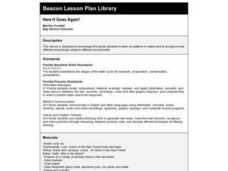Curated OER
Classify By Topic
Students explore and evaluate poetry. In small groups, they read and summarize poems, complete a handout, create and perform a dramatization of a poem, and write a journal entry in response to their performance.
Curated OER
Life Reflections in Songwriting and Poetry
Students analyze, discuss and compare sources of inspiration, use of words and imagery, and other differences in writing styles between two featured songwriters. This is an introductory lesson plan to a creative project unit.
Penguin Books
An Educator's Guide to Matched by Ally Condie
Even supposed Utopian societies have their flaws. Using an educator's guide, individuals explore the society Ally Condie creates in Matched. Reflective writing prompts double as discussion questions and cover key themes in the novel, as...
Curated OER
Historical Maryland Women
Learners identify objects, activities, and people in pictures of women in Maryland's history. In groups of four, they analyze photo packets of historical women. Students complete an acrostic using phrases reflecting specific...
Curated OER
Learning to Love That Poetry
Second graders listen to the novel, "Love That Dog." students reflect in a journal each day about the poetry form learned that day. They create their own poems following that format and have it for class the next day.
Curated OER
The Poetry of Woody Guthrie
Students develop oral fluency through reading and singing. They sing "This Land is Your Land" and discuss what the pictures and words mean in the song. They connect the song and poem and previous learning and write a journal.
Curated OER
Poetry Voices
Students investigate the performance aspect of poetry by reading, writing and discussing poetry pieces.
Curated OER
Responding To Rembrandt's Work Through Poetry
Students write poetry in response to Rembrandt's landscapes and portraits. They create accompanying illustrations based on interpretations of Rembrandt's work and present them along with the poems in book format.
Curated OER
Finding Synonyms
Student identify synonyms in poetry. In this grammar lesson, students define what a synonym is and view several examples on the board. Students read a selected poem on an overhead transparency and circle the synonyms.
Curated OER
Adopt a Tree
First graders describe the characteristics of a tree. In this science lesson, 1st graders create predictions about a book they will be listening to, Have you Seen Trees. Additionally, students describe their trees using their 5 senses....
Curated OER
A Poetic Finale
High schoolers write a poetic response to the Holocaust as a culminating activity to a unit on the Holocaust. They listen to and discuss a rap song about the Holocaust, complete various handouts, and write a poem for future generations.
Curated OER
Comets, Stars, the Moon, and Mars
Learners read the book Comets, Stars, the Moon, and Mars about space. In this space lesson plan, students make their own poetry book about space.
Curated OER
How Has Transportation Changed Since the 1899 Harriman Alaska Expedition?
Students recognize modes of transportation. They research historical data from a variety of primary and secondary sources including the Harriman expedition journals, related web sites, and photographs from the expedition. Students...
Curated OER
What Do We Learn From the Repartiation of Alaska Native Artifacts?
Students observe and evaluate evidence of Alaska Native cultural symbols and artifacts. They research historical data from a variety of primary resources, including the Harriman expedition journals, related web sites, oral accounts,...
Curated OER
Resistance Poetry
Students create a definition for the term resistance. Once a definition has been created, they create a visual image to correlate with their definition. Working in groups, students read several different resistance poems and classify...
Curated OER
Veterans' Voyages
Introduce your middle and high schoolers to a different perspective on war: that of soldier's. Read Guisseppi Ungaretti's poem "Vigil" to kick-start this instructional activity. After discussing his perspective, read "The Screaming...
Curated OER
Poets Got Them Blues
Contemplate what music learners listen to and why they listen. Can they find poetry within music lyrics? Specifically hone in on blues lyrics and ruminate upon the social issues prevalent in the themes. Particular song lyrics coincide...
Curated OER
Modern Minstrelsy: Exploring Racist Stereotypes in Literature and Life
Satires may be designed to expose a bias to ridicule but if misunderstood can they reinforce that bias? Langston Hughes poem, “Minstrel Man” opens a discussion of racist stereotypes, the minstrel tradition, and the musical, “The...
Curated OER
A New Life, a New Home
Young scholars connect with an immigration unit through research, journal writing, digital photography, and a movie production using iMovie. By acting out the immigrant's experience, students gain a deeper understanding and appreciation...
Curated OER
Be Specific, Go West To The Pacific
Fifth and sixth graders follow Lewis and Clark from St. Louis to the Pacific and back again. They read online journal entries made by Lewis and Clark to gather information. The official Lewis and Clark website is used by learners to...
Curated OER
Say Hi to Haibun Fun
What is a haibun? With this interesting lesson, writers will experience the Japanese writing form haibun, identify elements important to Japanese writing styles, analyze a haibun, and compose their own. Different from the typical journal...
Curated OER
Animal Fact or Fiction?
Read and discuss the article "Welcome to Cicadaville (Enter at Your Own Risk)" to gain a better understanding around the confusion regarding cicadas and locust swarms. In groups your young analysts research statements about animals to...
Curated OER
Music in Words
Your class can build strong, well-represented opinions about the music they hear. They listen to, and share thoughts about, a piece of classical music. Then they write a piece of music or a poem, and analyze their peers' work and their...
Curated OER
Here It Goes Again!
First graders work on patterns in nature and to recognize how different living things adapt to different environments such as the rain forest.


